“Congratulations on your new home!” – such an exhilarating statement to hear when you are the buyer.
Are you looking for a home that you can call your own? Most people do have that dream.
But buying and selling a house can be a tiresome process. If you are on the buying side, you need to work with a real estate agent. They help you to find the best houses in your desired locations and act as a link between you and the homeowners.
| 88% of the buyers purchase their homes through a real estate agent or a broker |
House hunting is not a one-day thing. It involves due diligence and thorough research, which sometimes takes months or even a year to find a dream place that you call “my home.”
You can also select the house of your choice from multiple listing services.
Once you make an offer as a prospective buyer and the seller accepts it, there is a sense of relief and excitement.
But wait!
It isn’t the end of your home-buying process.
You have now entered a new phase called “under contract.”
But what does being “under contract” mean to you as a buyer? Is there more to the real estate transaction? What is the final stage of a real estate contract?
Here’s what you need to know about a complete real estate transaction.
What Does Under Contract Mean?
A house is “under contract” when an offer is made by the buyer and accepted by the seller. This acceptance states that both parties concur to complete the transaction at an agreed purchase price and other key real estate terms.
Such approval also prompts the seller to not get into any other sale contract as the buyer is under the obligation to purchase the house. (This situation is very contract specific).
Under contract terms, this is also applicable to real estate contracts containing contingencies.
A contingency can be defined as a condition on which the sale depends.
For example, the buyer will complete the transaction when they sell their current home or when the lender approves the financing for the new purchase. If the buyer is unable to meet the contingency requirements, then the contract will be deemed void.
Many real estate contracts do contain contingencies, causing the contracts to fail. This leaves the parties to either walk away from the deal or renegotiate the terms of the contract.
Basics of under contract
Here are some basic requirements that help a buyer get a home under contract:
- The seller must accept the buyer’s offer.
- The parties consider a home under contract only when there is a sign on the dotted line, making such contracts enforceable. (Realtors stress the importance of having a written contract because they are easier to enforce. Written contracts are usually preferred over verbal agreements.)
- The buyer is expected to provide something of value to the seller to make the contract valid, such as putting earnest money in an escrow account.
The earnest money holds the seller from accepting another offer. In case of a breach
- by the buyer, the seller gets to keep the money
- by the seller, the earnest money is returned to the buyer
And if the deal goes through then this money is added towards the final home sale price.
| Quick bite – Earnest money: A sum of money is deposited in a major transaction, usually in real estate dealings, to implicate the seriousness and genuineness of the party towards the transaction and the overall deal. Escrow account: Escrow accounts are used to securely store temporary funds. They are widely used in the real estate industry. |
Stages of a real estate transaction – home sales
Here are the steps on how an extensive process of buying and selling a house is completed from initiation to the final signing and handover of the house.

- Finding a house that the buyer likes
Buyers go through several options from the listings and shortlist the right house that they want to buy.
- The buyer makes an offer
After consultation with their realtor, the buyer prepares an offer to bid for their chosen house.
- The seller accepts the offer
If and when the seller accepts the buyer’s offer, the house is no longer available in the market for another buyer to bid. The contract status of this house will be updated to “under contract” or “pending” in the multiple listing services.
Even though the basic terms have been agreed upon by the parties, after accepting the offer, there is still room for negotiations, leading to multiple revisions and amendments before the final contract is signed.
- Buyer and seller accept and sign the contract together
The contract is still dependent on contingencies like securing finance from the lender or a final home inspection report from the home inspector, allowing both parties to discuss the terms and back out if needed.
- The buyer makes a down payment (earnest money) to the seller into an escrow account
A down payment or earnest money is usually paid by the buyer to express their genuineness and sincerity towards the proposed offer. This helps to seal the deal. The amount paid is usually between one percent to five percent of the total asking price of the house.
The buyer’s real estate agent could advise on the best plan of action on the amount of earnest money to be paid to secure the house.
- Securing finance from a mortgage lender
If the buyer is securing a mortgage from a lender to finance their purchase, they will need all the necessary documents and information. This will help to convince the lender that the buyer is capable of paying off the mortgage within the stipulated time frame.
- A home inspection by the buyer
Getting an inspection done is critical for a home buyer. Such inspections are usually conducted by home inspectors with extreme precision to uncover any unexpected maintenance issues or repairs and damage that might add to the closing costs.
Such home inspections are usually followed up with a discussion between the parties where the issues are addressed before finalizing the deal. The negotiation is concerned with financial concessions or requests to repair before signing the current contract.
| The biggest home-buying regret shared by 36% of homeowners was “unexpected repairs and maintenance” |
- Home appraisal
Just like a home inspection is done by the buyer to check for damages, a home appraisal contingency is put up by the mortgage lender. The lender appoints an appraiser to assess the value of the home and ensure that both the buyer and the lender are making a wise financial decision.
- Closing the deal
Finally, after crossing all the hurdles from negotiations to inspections and appraisals, the deal is closed when the dotted line is signed and the ownership of the house is transferred from the seller to the buyer.
What do real estate agents mean by under contract and pending sales?
Both terms are used interchangeably by real estate agents depending on the listings they refer to or the region they work in.
An Under Contract term is updated in a listing when the buyer makes an offer and the seller accepts it. This will comprise the first four steps of the real estate transaction.
Pending Sales can be defined as a home under contract where all the hurdles are crossed and the final step to owning a house is pending. This means that all the contingencies are met and the final transfer of ownership is pending.
The bottom line is that a house listed as sale pending is much closer to finalizing the deal compared to an under contract house.
Does it give the possibility for another buyer to present a backup offer for houses listed as under contract in multiple listing services?
Let’s find out!
Can a backup offer be made for a house under contract? – Consult with your real estate agent
If you like a house that is listed as under contract, you can make a backup offer to the seller. There is a possibility of the current contract not going through as there is a long list of contingencies to be met.
The seller’s realtor will continue to accept offers until any specific clause of the agreement restricts them from showing the home to other potential buyers.
The situation might not be the same for houses with the status of sale pending. These houses are very close to finalizing the deal and make it nearly impossible for the seller to still accept other offers.
Either way, you can consult with your agent and figure out the best way to find and finalize a house that meets your requirements.
Do you want to create an error-free real estate contract? – Draft it with Revv
If you are a buyer who is trying to find a house – drafting, reviewing, and managing a contract might not be your forte.
And if you are a real estate agent, part of the National Association of Realtors, helping buyers to find a house, dealing with multiple real estate contracts will be your day-to-day job.
No matter which shoes you fill in, Revv – a document management software will help you with all your documents while you focus on the primary task of finding the dream house.
One of Revv’s most important offerings is the real estate document template. These are legally verified easy-to-customize templates. The buyer or agent can quickly edit and share it with the seller in no time and not miss out on any opportunity. Using templates reduces the need for drafting a contract from scratch.
Revv also offers –
- Feature-rich document editor: An easy-to-use editor that helps you to make any changes to your template or document uploaded in the Revv platform. You can add/edit texts and images, insert quote tables, connect Google Sheets, integrate your payment system, add eSignature tabs, etc.
- Faster collaboration with team members: Make your contracts error-free by actively collaborating with your team members in real-time with the Notes feature. You can tag people using @mentions and ask them to review or add any input to your contract.
- Effortless data mapping: Revv’s Data Studio feature enables users to map small to complex data from existing business applications to Revv templates seamlessly.
- Seamless integration with multiple software: Perform a range of tasks without leaving your company’s existing business platforms. Seamlessly connect your Revv account with other apps like Box, Slack, Hubspot CRM, Salesforce, Google Drive, and more via Zapier, Revv APIs, or Retool integration capabilities.
- Flexible and secure eSign options: Revv not only helps in drafting an impeccable real estate contract but also helps to close the house deal faster with the eSignature feature. Revv eSignatures are bank-grade and follow all compliant measures. Recipients or signers can also customize their signatures in Revv. They can draw, upload, choose from pre-formatted text styles, or connect with a crypto-wallet to sign the contract document.
- Multiple alternatives for eSign: As we know, before a final contract is drawn for purchasing a property, there will be a lot of other documents that require the approval from seller or buyer. Using eSignature for each of these documents is an expensive affair. And moreover, these documents might not be needing an eSignature. During such instances, you can opt for:
- Check and send for internal approval feature: when your contracts need approval from management or review from other departments inside the company.
- Send by email: if contracts need to be reviewed by someone outside the company.
- Send for acceptance: for documents that merely need an acceptance from the recipients.
- Legally admissible audit trail: Paper-based contracts can be easily tampered with and could be proved fake in a court of law. But with Revv, make your contracts 100% tamper-proof and legal. Every signed contract in Revv generates a detailed audit trail or Evidence Summary report. It chronologically stores each action taken in the contract.
- Tracking and analysis of contracts: Revv’s Activity tab provides real-time recipient activity monitoring and helps to make informed decisions. For instance, if a real estate agent sends a contract to a buyer for signature, the real estate agent could see all the activities of the document, such as when the buyer has opened the contract, whether he/she has signed it, if not, then check with the buyer about the bottleneck, etc.
- Integrated payment option with Stripe: PCI/DSS compliant direct integration with payment providers such as Stripe for adding payment options to your contract documents.
- Automating the entire contract lifecycle: Keeping human interaction to a minimum is the most practical need for any business. Revv helps to automate every step of the contract creation process, from start to finish. The automation capabilities are enhanced by the Pipeline feature. You can easily automate end-to-end business workflows for your organization and eliminate redundant processes by utilizing varied features of the Pipeline.
- Unlimited storage: Documents in Revv can be accessed anytime, anywhere, and from any device. Revv offers unlimited document storage option in a central cloud-based location.
Create all your digital contracts and other documents seamlessly with Revv.
Don’t let your dream house slip away!
For a lot of people, owning a house might not be a necessity (you can always rent out an apartment!) but a dream come true. Not getting your dream house because someone beat you to the punch in sending the offer can be disheartening.
Timely securing your house and changing its status to under contract in the multiple listing services or in an open house event is critical. You need to work together with your real estate agent and come up with the best offer you can send, after analyzing the market rates, financial options, interest rates on mortgages, etc.
Pick your house, discuss it with your agent and make that offer that the seller can’t refuse! Draft your offer documents and real estate contracts with Revv templates and make the move to bag your dream house.
Try Revv today!



